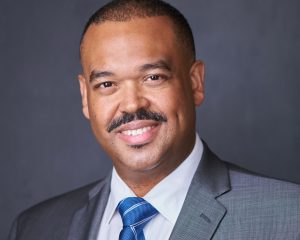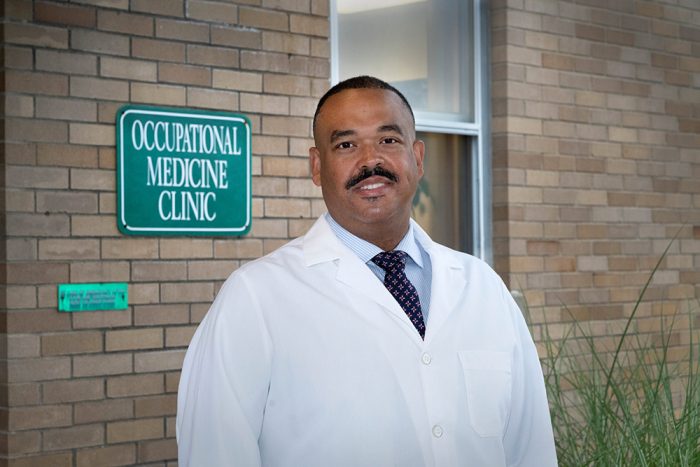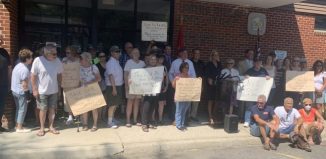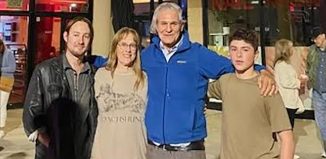BNL’s John Clarke uses music to deliver medical messages
By Daniel Dunaief
Live from Upton, New York, it’s … Dr. John Clarke.
While the arrival of the new Occupational Medicine Director and Chief Medical Officer at Brookhaven National Laboratory doesn’t involve late-night comedy, or a live studio audience, it does bring a medical doctor with a passion for bringing his rap and musical skills to a health care audience.

Formerly the director of occupational medicine at Cornell University, Dr. Clarke joined the Department of Energy lab as Occupational Medicine Director and Chief Medical Officer for BNL in June..
“My role is to help maintain safety and wellness among the workers,” said Dr. Clarke. “If we have employees who start coming in for some sort of complaint and we see a pattern, that may help us identify who could be at risk of something we didn’t know about that we are detecting.”
A doctor who served as chief resident at New York Medical College in family residency and Harvard University in occupational & environmental medicine, Dr. Clarke said he plans to support a range of preventive efforts.
“I’m excited about the potential to engage in what’s considered primary prevention,” said Clarke, which he defined as preventing a disease from occurring in the first place.
Through primary prevention, he hopes to help the staff avoid developing chronic illnesses such as cancer, while also ensuring the health and responsiveness of their immune systems.
Through physical fitness, a plant-based diet including fruits and vegetables, adequate sleep and hydration with water, people can use lifestyle choices and habits to reduce their need for various medications and enable them to harness the ability of their immune systems to mount an effective response against any threat.
“Modifying your lifestyle is the therapy,” he said. “If you engage [in those activities] in the right way, that is the treatment.”
Dr. Clarke added that the severity and stage of a disease may impact the effectiveness of such efforts. For any vaccine and for the body’s natural immunity to work, people need a healthy immune system.
When Dr. Clarke practiced family medicine, he saw how patients lost weight through a diet that reduced the need for medication for diabetes and high blood pressure.
“Losing weight and staying active does provide a therapeutic impact, where you could be medication free,” he said.
To be sure, living a healthier lifestyle requires ongoing effort to maintain. After reaching a desired weight or cholesterol level, people can backslide into an unhealthier state or condition, triggering the occurrence or recurrence of a disease.
In the vast majority of cases, Clarke said, “you have to make a permanent lifestyle change” to avoid the need for pharmaceutical remedies that reduce the worst effects of disease.
BNL has an exercise physiologist on staff who “we hope to engage in consultations with employees,” said Clarke. He would like the exercise physiologist to go to the gym with staff to show them how to use equipment properly to get the maximum benefit.
BNL already has some classes and various initiatives that promote wellness. “One of the things we’d like to do is coordinate and try to publicize it enough where employees are aware” of the options available at the lab to live a healthier and balanced life, he added.
BNL also has a dietician on staff. Dr. Clarke has not worked with the dietician yet, but hopes it will be part of an upcoming initiative. As he and his staff respond to the demand, they will consider bringing on other consultants and experts to develop programs.
Covid concerns
Like others in his position in other large employers around Long Island, Dr. Clarke is focused on protecting workers from any ongoing threat from Covid-19.
“We’re still learning more as [SARS-CoV2, the virus that caused the pandemic] evolves,” he said. BNL does a “great job about monitoring the prevalence and the numbers of cases in Suffolk County and among workers.”
Dr. Clarke said he and others at BNL are following the Department of Energy, New York State and Centers for Disease Control and Prevention guidance on these issues.
If the numbers of infections and hospitalizations increase in the coming months, as people move to more indoor activities, BNL may consider deploying a strategy where the lab provides more opportunities for staff to work remotely.
Prior to his arrival at BNL, Dr. Clarke worked as a consultant for a company that was looking to create numerous permanent jobs that were remote.
He suggested that workers need to remain aware of their remote surroundings and shouldn’t work near a furnace or any heater that might release dangerous gases like carbon monoxide.
Additionally, people should avoid working in areas that aren’t habitable, such as in an attic. Dr. Clarke urges people to notify and consult their employer if they have concerns about working safely at home or on site.
Music vs. medicine
A native of Queens who spent three years of his childhood in Barbados, Dr. Clarke attended Columbia University, where he majored in sociology and music while he was on a pre-med track.
While he was an undergraduate, Dr. Clarke wrote, produced and performed original music. An independent label was going to help secure a major label deal.
He chose to attend medical school at Icahn School of Medicine at Mount Sinai.
Dr. Clarke has championed a program he calls “health hop,” in which he has used rap to reach various audiences with medical care messages. In 2009, he won a flu prevention video contest sponsored by the Department of Health and Human Services for an “H1N1 rap.”
Train commuters may also recognize him from his work for the Long Island Railroad, for which he created a “gap rap.” The public service announcement was designed to protect children from falling into or tripping over the gap between the train and the platform.
Dr. Clarke has produced music for numerous genres, including for a children’s album and a Christian album.
As for life outside BNL, Dr. Clarke is married to Elizabeth Clarke, who is a nurse practitioner and is in the doctorate of nursing practice and clinical leadership program at Duke University.
When he’s not spending time with his wife or their children, he enjoys home projects like flooring and tiling.
Dr. Clarke is pleased to be working at the national Department of Energy lab.“BNL is a great place, because the science and the work they do has an impact,” he said.







